Review| ‘Zootopia’, We’re All Animals… Sort Of
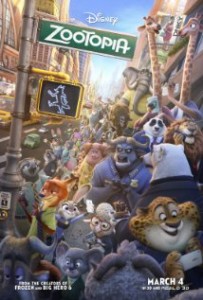 Zootopia continues a winning streak of fun, interesting, and heartfelt films from Walt Disney Animation Studios (with the exception of Frozen).
Zootopia continues a winning streak of fun, interesting, and heartfelt films from Walt Disney Animation Studios (with the exception of Frozen).
A world comprised of anthropomorphized animals is nothing new at Disney (see the classic 1973 feature Robin Hood). However, this isn’t animals standing in for humans in a human-created world, but an entire society made by animals for animals. That makes for an interesting tale, especially in the world-building department. But this film is more parable than fairy tale, and has a lot to say about human society.
Zootopia‘s themes about prejudice and stereotypes are definitely prescient (and lacks a bit of subtlety sometimes). It is a reminder that pigeonholing someone based on an outward characteristic is unfair and, most importantly, un-Christlike.
Welcome to Zootopia! SPOILERS AHEAD
Stuff I Liked
Zootopia‘s character animation is very clever. The animals are intelligent, have personalities, and act like humans, but they still have moves and quirks that subtly remind the audience tat they are still animals. The best example is Judy Hopps’ quivering nose. It twitches up and down at random points in the film, just like an actual rabbit’s nose would. Not only is it cute, but it makes her a believable rabbit. It’s a detail that hearkens back to Thumper’s nose in Bambi.
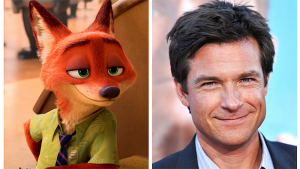 I love when the personality of the voice actor is successfully instilled in the look of the character they are helping to bring to life. Nick Wilde is one of the finest examples of this in recent years. The Disney animators took Jason Bateman’s sarcastic faces and vocal inflection and turned it into a portion of the character’s look. Not since Scar in The Lion King or Hades in Hercules has there been a better rendered personality in animation.
I love when the personality of the voice actor is successfully instilled in the look of the character they are helping to bring to life. Nick Wilde is one of the finest examples of this in recent years. The Disney animators took Jason Bateman’s sarcastic faces and vocal inflection and turned it into a portion of the character’s look. Not since Scar in The Lion King or Hades in Hercules has there been a better rendered personality in animation.
The visual gags were hilarious. They’re based upon things we know about animal behavior and they are played for maximum cuteness and hilarity. One of my favorites was Nick selling “paw-sicles” to a group of lemming businessmen. The lemmings followed each other to Nick’s stand and one by one they bought and ate the frozen treats. Another hilarious sequence involves a police chase through a rodent-sized portion of the city.
The production design of this film just screams “build me.” The buildings and other structures have a personality and color palate that suggests an innate sense of optimism. I want to visit Zootopia. I haven’t felt this strongly about visiting a fictional place since Jurassic World. Here’s hoping that the film’s success will prompt Disney to build a Zootopia-themed land at one of its parks. Disney’s Animal Kingdom, anyone?
Michael Giacchino once again creates a marvelous score as diverse in style as the species of the inhabitants of Zootopia. He adapts so many genres and somehow they all blend together wonderfully: 1960s lounge, 1970s funk, cartoony acton themes, Italian mandolins. It all works.
Stuff I Didn’t Like
While the premise was clever, and an interesting vehicle to explore themes like prejudice (which I will talk about later in this review), there were times when the analogy fell apart.
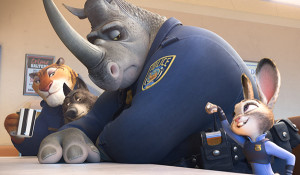 Comparing different species of animals to human beings of different skin tones, religions, cultures, etc. is a bit hard to swallow. I know what the filmmakers were trying to do, but it didn’t come across in a logical way for me. These animals are of different species. They aren’t really related to one another, aside from the fact that they’re animals.
Comparing different species of animals to human beings of different skin tones, religions, cultures, etc. is a bit hard to swallow. I know what the filmmakers were trying to do, but it didn’t come across in a logical way for me. These animals are of different species. They aren’t really related to one another, aside from the fact that they’re animals.
The analogy would have worked better if the city was comprised entirely of one type of animal – dogs, for example. They are all the same species, but with variations to make great points about human society. Some are white, black, brown, long, short, aggressive, passive, etc. They have different behaviors that could be construed as stereotypes (“You’re a chihuahua, so you must be cold all the time”).
I think I understand that the filmmakers wanted to hit the diversity angle on the nose (or muzzle, as it were) with drastically different types of animals. In fact, this could be a bit heavy-handed at times. I’m not sure if they were trying to comment on the politically-correct speech of modern times or not, but it didn’t come across well. Things like Judy telling Clawhouser that he can’t call her “cute” as if it’s some kind of racial slur elicited an eye roll and silent “come on” from me.
If I really wanted to knit-pick, I could say that it’s a bit hypocritical that the film is clearly championing not giving in to stereotypes, but one of its best gags stereotypes DMV employees as slow-moving sloths (which is both a poignant commentary and a very funny gag). I guess some stereotypes are okay to tap into?
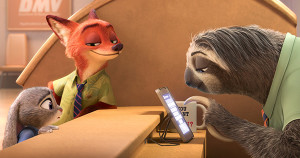 The plot of the film hinged on a pretty flimsy revelation: the predators were “going savage” because of a toxic flower. It’s a pretty big leap in logic that getting shot by a ball of serum would cause the animals to go wild. No explanation is given as to why; just that it’s poison. What? There are hints of Frozen-sized flaws here (Elsa just has powers because magic). Lazy storytelling and a total cop-out.
The plot of the film hinged on a pretty flimsy revelation: the predators were “going savage” because of a toxic flower. It’s a pretty big leap in logic that getting shot by a ball of serum would cause the animals to go wild. No explanation is given as to why; just that it’s poison. What? There are hints of Frozen-sized flaws here (Elsa just has powers because magic). Lazy storytelling and a total cop-out.
What would have been more interesting, and better suited for the story I’m assuming they wanted to tell, is to have the “savage” state be indeed part of their nature. In fact, have it be part of everyone’s nature – predator and prey. It would add another dimension to the story is these animals needed to “fight” with their own natural state.
Stuff to Ponder
Regardless of the quality of the logic, this film’s main theme takes an interesting look at prejudice, particularly stereotyping. Like humans, the animals of Zootopia have biases toward species (read: races and cultures) other than their own. Foxes are seen as sly and untrustworthy. Bunnies are cute and unintelligent. The cynical Nick just gives into the stereotype while the more optimistic Judy wants to overcome them to prove she is more than what others see her as.
One of the most poignant scenes for me came early in the film, when Judy was saying goodbye to her parents and setting off to the big city. Her dad cautions Judy to watch out for foxes, citing some general stereotypes about them. Judy’s attitude is that each being is an individual that can be good or bad. “I’ve known a lot of bunnies who were jerks,” she responds.
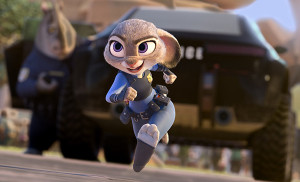 Judy’s outlook is really the best to have when it comes to combating prejudice. Grouping people and assigning suppositions based on some arbitrary trait like skin (or fur) color is absurd. We are each individuals that have our own personalities, backgrounds and experiences that make us who we are. We may do similar things in a culture, but we can all think for ourselves. There is a definite sense of pride in stereotyping, in that it infers some kind of superiority of one group over another.
Judy’s outlook is really the best to have when it comes to combating prejudice. Grouping people and assigning suppositions based on some arbitrary trait like skin (or fur) color is absurd. We are each individuals that have our own personalities, backgrounds and experiences that make us who we are. We may do similar things in a culture, but we can all think for ourselves. There is a definite sense of pride in stereotyping, in that it infers some kind of superiority of one group over another.
Jesus was the victim of stereotyping, such as in the Book of John, when Philip told Nathanael about the mysterious Man from Nazareth. “Can anything good come out of Nazareth?” Nathanael replied, pigeonholing Jesus as just another unscrupulous Nazarene (John 1:46). But upon meeting said Nazarene, Nathanael changes his tune and declared Him the Son of God. He must have felt pretty terrible about his previous assumptions.
“Judge not, or you too will be judged. For in the same way you judge others, you will be judged, and with the measure you use, it will be measured to you.” Matthew 7:1-2
This is probably one of the most famous verses in all of Scripture, and is used primarily by non-believers to justify the lifestyles they have chosen. However, like all pieces of Scripture, the purpose and context of this verse are extremely important. Jesus is not saying we shouldn’t make any judgement calls. In the same chapter, Jesus talks about not throwing “your pearls to pigs” (Matthew 7:6), explaining that sometimes we do indeed need to make judgements about right and wrong, and hold others accountable, especially fellow believers. What is wrong is condemning people to their sin, and writing them off as “just another sinner.”
There is a time and place to judge whether behavior and actions are right and wrong. But condemning a person is always wrong. It’s important that we not write people off because of where they come from, what they look like, or how they act.
“Therefore, there is now no condemnation for those who are in Christ Jesus.” Romans 8:1
Another of Zootopia‘s larger points speaks to that aforementioned universal truth we all have in common as human beings. Just as all the animals in the film have the capability of “going savage,” we humans all have the potential to do great harm. But, we are called to live according the Spirit, not a life according to our flesh (see Romans 8:4).
Everyone of every race, creed, culture, etc has propensity towards sin. There is no class of people that is better than any other arbitrary grouping. We are all capable of sin in our hearts, and biases toward those different from us. And no matter how much we think we have “evolved,” deep down we are still sinners. That is a very humbling thought, and puts us all on the most level of playing fields.
“As it is written: ‘There is no one righteous, not even one.'” Romans 3:10
We all fall short of the glory of God (Romans 3:23), therefore we all need God to help us overcome the “savage” nature of our flesh. The awesomeness of Christ is that He already knew that and He already saved us. Even though we are awful, terrible sinners, Christ died for us (Romans 5:8).
“Life is a bit messy. No matter what type of animal you are, change starts with you.” -Judy Hopps
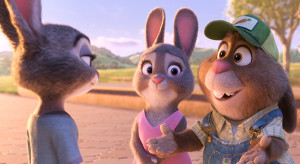 With that knowledge, and through life in Christ, we are called as individuals to walk in the Spirit and not in the flesh. That life includes not judging those around you, or making assumptions about someone based on an outward impression. We have the capacity to do better when it comes to treating others with love and respect. We will fail, as is out nature. But through Christ, we can overcome our own flesh and show others the love of God.
With that knowledge, and through life in Christ, we are called as individuals to walk in the Spirit and not in the flesh. That life includes not judging those around you, or making assumptions about someone based on an outward impression. We have the capacity to do better when it comes to treating others with love and respect. We will fail, as is out nature. But through Christ, we can overcome our own flesh and show others the love of God.
So What I’m Saying is…
Zootopia is another solid entry into the Disney Animated Feature canon. With a fun premise, great characters, hilarious gags, and a whole lot more, it’s sure to please everyone. It succeeds in getting its point across, despite some hiccups in logic.
The point the film is trying to make is a very important one. We all have to remember that each of us are individuals and should not lump a group together based on stereotypes and prejudices. There will always be bigoted people in the world; that is the nature of sin. But it is up to each one of us to be like Jesus and treat everyone with love and kindness. After all, we are just as sinful in the eyes of God as anyone else, and Jesus had the inconceivable grace to pardon us with His death on the cross.


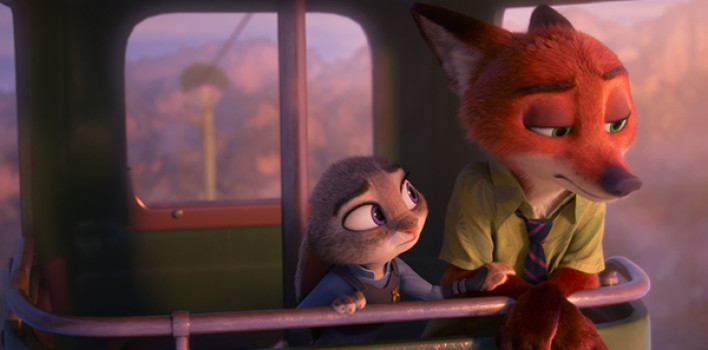
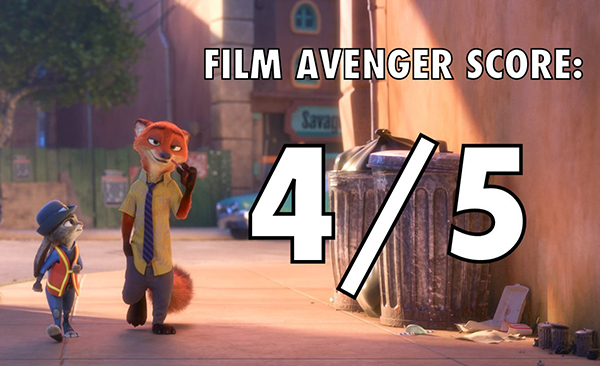
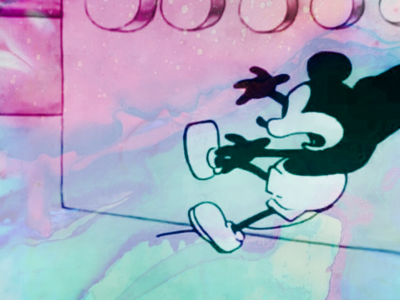
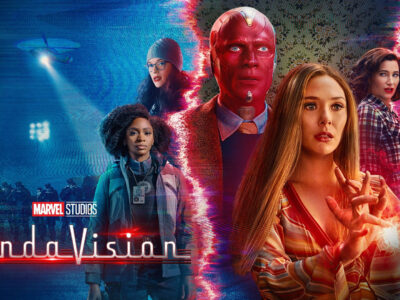



Pingback: #096 – Zootopia and Following Your Dreams | Reel World Theology